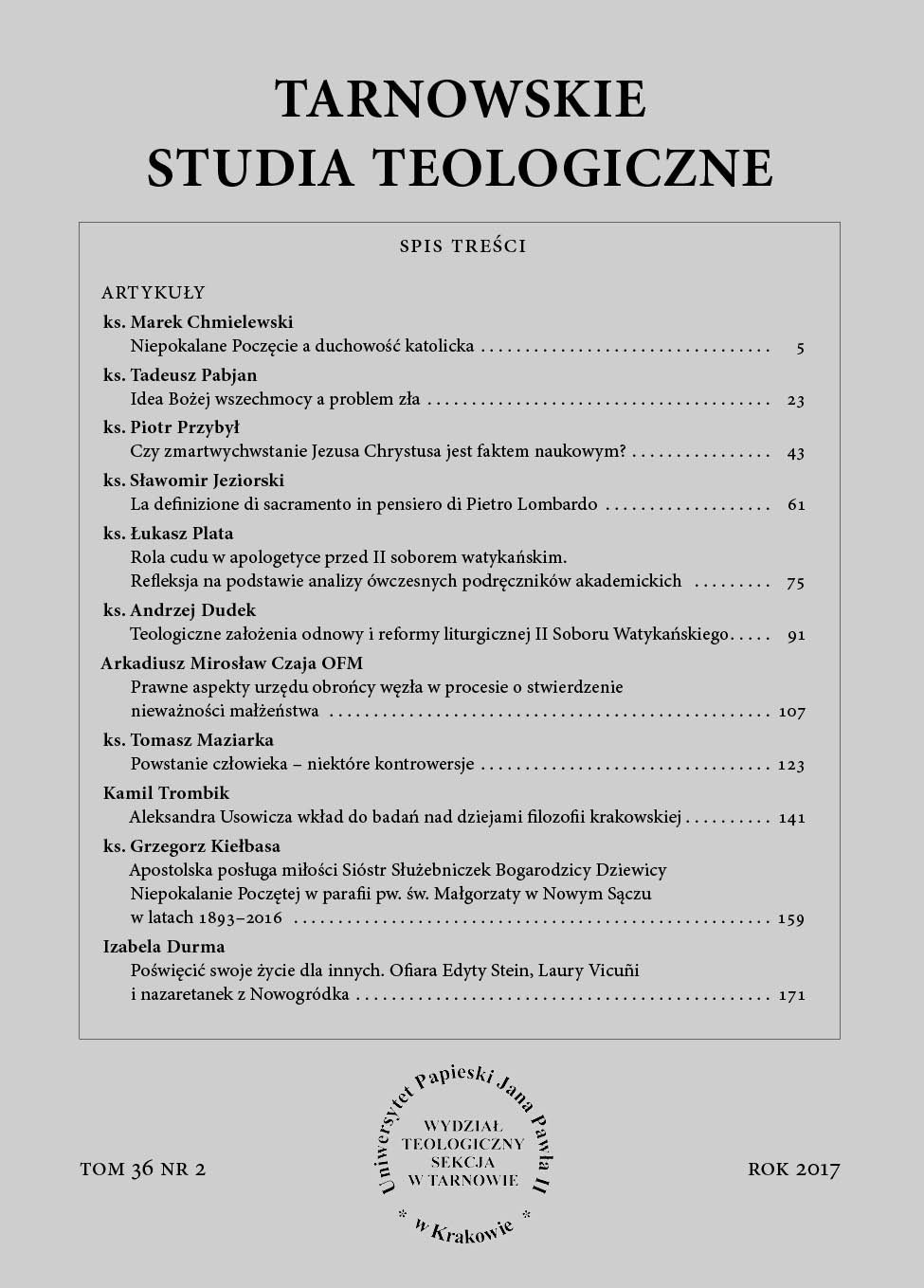Idea Bożej wszechmocy a problem zła
DOI:
https://doi.org/10.15633/tst.2613Słowa kluczowe:
Boża wszechmoc, problem zła, zło fizyczne, prawa przyrodyAbstrakt
Tematyka artykułu oscyluje wokół koncepcji Bożej wszechmocy postrzeganej przez pryzmat głównego problemu teodycei, która stara się znaleźć odpowiedź na pytanie, dlaczego Bóg pozwala na zło. Jeden z argumentów wykorzystywanych w ramach tej dyscypliny odnosi się do różnego rodzaju ograniczeń Bożej wszechmocy, które decydują o tym, że z pewnych względów wszechmocny Stwórca nie może zapobiec różnym formom zła. Takim ograniczeniem jest np. wolność darowana człowiekowi – pozwalając na istnienie wolnej woli Bóg nie może powstrzymać działań człowieka prowadzących do zła. W artykule poddano analizie nieco inny aspekt tego samego ograniczenia, który ma związek z funkcjonowaniem świata przyrody: Bóg daje wolność nie tylko rozumnemu człowiekowi, ale również całej materii, która w granicach wyznaczonych przez prawa przyrody może doświadczać autentycznej autonomii. W tej interpretacji zło fizyczne jawi się jako prosta konsekwencja integralności procesów przyrodniczych. Pierwsza część artykułu dotyczy samej idei Bożej wszechmocy; w drugiej części idea ta zostaje odniesiona do koncepcji praw przyrody; w trzeciej i ostatniej omówiony jest tzw. nieinterwencjonistyczny model działania Boga w przyrodzie.
Bibliografia
Anzelm z Canterbury, Monologion. Proslogion, tłum. T. Włodarczyk, Warszawa 1992.
Clayton P., God and Contemporary Science, Edinburgh 1997.
Damiani, O wszechmocy Bożej, tłum. I. Radziejowska, Warszawa 2010.
Descartes R., Rozprawa o metodzie, tłum. W. Wojciechowska, Warszawa 1988.
Descartes R., Zasady filozofii, tłum. I. Dąbska, Warszawa 1960.
Edwards D., Jak działa Bóg?, tłum. M. Chojnacki, Kraków 2013.
Funkenstein A., Theology and the Scientific Imagination from the Middle Ages to Seventeenth Century, Princeton 1986.
Haught J. F., Odpowiedzi na 101 pytań o Boga i ewolucję, tłum. J. Kochanowicz, Kraków 2003.
Heller M., Ostateczne wyjaśnienia wszechświata, Kraków 2006.
Heller M., Uchwycić przemijanie, Kraków 1997.
Hooykaas R., Religia i powstanie nowożytnej nauki, tłum. S. Ławicki, Warszawa 1975.
Janowski Z., Teodycea kartezjańska, Kraków 1998.
Judycki S., Wszechmoc i istnienie, „Internetowe Czasopismo Filozoficzne Diametros” 21 (2008), s. 30–62.
Koszkało M., Pepliński M., Wszechmoc, w: Przewodnik po filozofii religii. Nurt analityczny, red. J. Salamon, Kraków 2016, s. 37–59.
McMullin E., Ewolucja i stworzenie, tłum. J. Rodzeń, Kraków 1993.
Pabjan T., Anatomia konfliktu. Pomiędzy nowym ateizmem a teologią nauki, Kraków 2016.
Pepliński M., Problematyka wszechmocy Boga – rzeczy nowe i stare, „Filo-Sofija” 15 (2015) nr 30/3, s. 11–44.
Stoeger W. R., The Mind-Brain Problem, the Laws of Nature and Constitutive Relationships, w: Neuroscience and the Person: Scientific Perspectives on Divine Action, ed. R. J. Russell et al., Vatican City State–Berkeley 1999.
Tomasz św., O wieczności świata, w: Św. Tomasz z Akwinu, Dzieła wybrane, tłum. J. Salij, Warszawa 2001, s. 277–285.
Tomasz św., Suma teologiczna, tłum. P. Bełch, Londyn 1977.
Życiński J., Bóg i ewolucja. Podstawowe pytania ewolucjonizmu chrześcijańskiego, Lublin 2002.
Opublikowane
Numer
Dział
Licencja
Autorzy publikujący w czasopiśmie udzielają jego wydawcy zgody o następującej treści:
- Autor zachowuje autorskie prawa majątkowe do utworu, a jednocześnie udziela wydawcy czasopisma zgody na jego pierwszą publikację w wersji drukowanej i wersji online na licencji Creative Commons Uznanie autorstwa 4.0 Międzynarodowe oraz zgody na wykonywanie opracowań, w tym przekładów.
- Autor ma możliwość udzielania zgody niewyłącznej na opublikowanie utworu w wersji, która ukazała się w czasopiśmie (np. zamieszczenia go w repozytorium instytucjonalnym lub opublikowania w książce), wraz z informacją o jego pierwszej publikacji w czasopiśmie.
- Autor może umieścić swój utwór online (np. w repozytorium instytucjonalnym lub na swojej stronie internetowej) jeszcze przed zgłoszeniem utworu do czasopisma.

